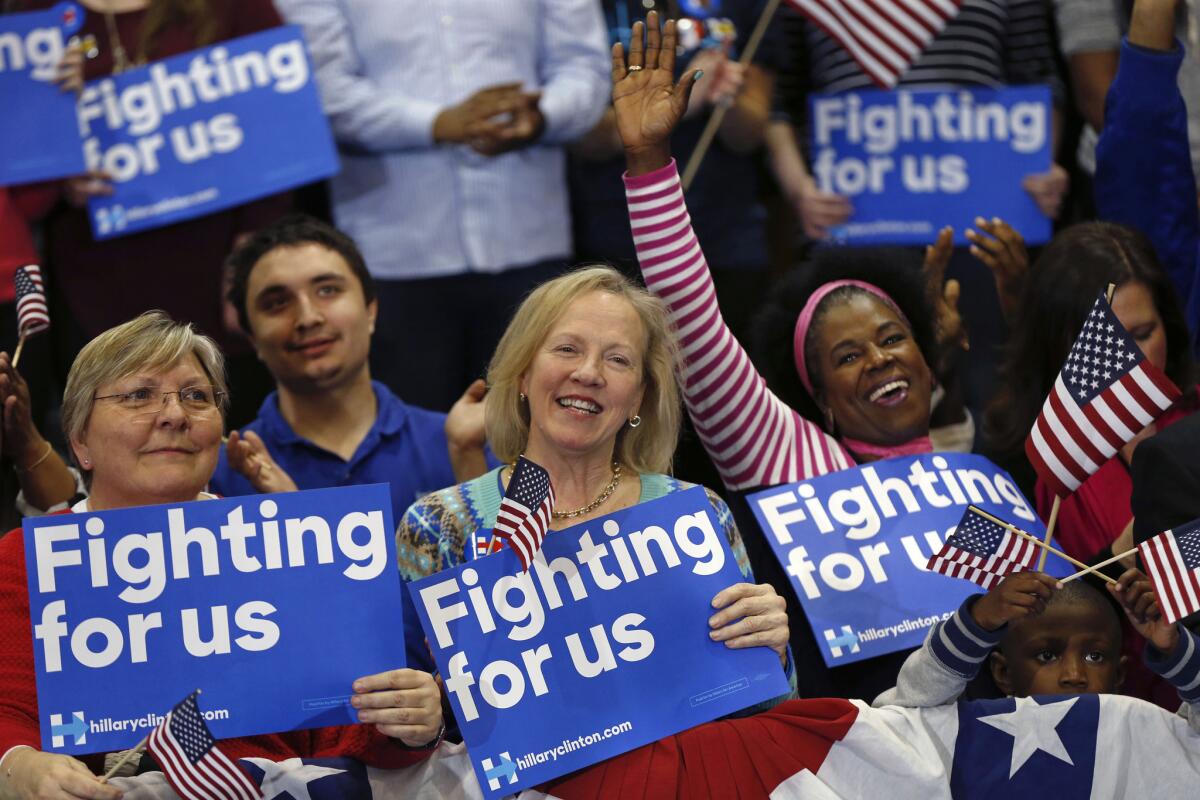Analysis:: What now for Bernie Sanders? Hillary Clinton’s South Carolina win puts him on his heels

Sen. Bernie Sanders at a campaign event Saturday in Rochester, Minn.
What now, for Bernie Sanders?
Hillary Clinton’s overwhelming victory in South Carolina on Saturday did many things for her campaign: It gave the candidate more confidence and voice, extended her momentum as she moves into a big band of states voting Tuesday and made good on her campaign’s long-uttered assurance that her troubles would ease as the race moved out of the largely white early states.
As the South Carolina results lifted the hard questions from Clinton’s campaign, it deposited them on the insurgent senator from Vermont. Sanders must now fight not only a hypothetical front-runner, as Clinton was for so long, but one who has claimed that role with actual votes.
And he must do so while facing a yawning gap in the polls in most of the states ahead, a gap that will only be harder to close without the momentum that comes with victory.
It’s never a good sign when a candidate has to flatly say that he’s continuing in the race, as Sanders did in a statement on Saturday.
“This campaign is just beginning. We won a decisive victory in New Hampshire. She won a decisive victory in South Carolina. Now it’s on to Super Tuesday,” he said, ignoring Clinton’s narrow win in Iowa and her convincing win in Nevada.
Later, speaking to a huge crowd in Rochester, Minn., Sanders struck a somewhat downbeat tone before heading into his standard remarks about a corrupt political system and an economy rigged to benefit the wealthy.
“What this campaign is about is not just electing a president,” he said. “Yeah, that’s really important and there’s something that’s more important ... it’s about transforming America. It’s about thinking big.”
Clinton’s victory was so striking that, according to exit polls of voters, she won even among those who most valued a candidate’s honesty and caring — two groups that had sided strongly with Sanders in votes earlier this month. She also sealed the win long ago, with overwhelming support among the big majority of voters who had decided which candidate to back either last month or beforehand.
The absence of many persuadable voters hurt Sanders’ cause and likely stemmed from Clinton’s standing among African American voters, who made up about 6 in 10 Democratic voters, a higher percentage than in the past.
That disproportionately heavy black turnout will probably not be fully replicated in all of the states ahead. But as Clinton benefited Saturday from the momentum of her victory a week ago in Nevada, she now goes into the 11 states voting March 1 with a wind at her back from South Carolina.
As she attempts to extend her delegate lead over Sanders, and Sanders tries to regroup from two successive losses, the landscape ahead is strongly in Clinton’s favor.
A Real Clear Politics average of polls in the states up for grabs Tuesday found Clinton leading in nine, essentially tied in one and losing to Sanders only in Vermont, which will have the day’s smallest delegate stash.
Among the larger states, Clinton was ahead by more than 20 points in Texas, Georgia, Minnesota, Colorado, Tennessee, Alabama and Arkansas. She led by more than 19 points, in the average, in the general election battleground of Virginia. Besides his home state, Sanders’ best chance lies in Massachusetts, where the candidates were within less than a point.
Polls can change, of course, and two of the contests, Minnesota and Colorado, are caucuses, which are hard to predict with surveys. Moreover, Sanders has the money to make his presence felt in the Tuesday states and far beyond. But the campaign has largely moved beyond the states where he appears strongest. And partly due to the pressure he has applied, Clinton has become a stronger candidate.
She’s not facing the full fusillade of a general election campaign yet, far from it. Sanders has largely ignored criticisms of Clinton’s use of a private email system as secretary of State, which Republicans raise in almost every appearance.
Within the confines of the Democratic contest, however, Clinton has honed a message that is more accommodating of the anger in the 2016 electorate than was her original sales pitch.
As she did last Saturday in Nevada, Clinton made an effort in her South Carolina acceptance speech to cast her campaign as inclusive. The favored pronoun was “we,” not “I.”
“We’re going to work together to give our children the education they need and deserve here in South Carolina and across America,” she said, recounting visits to decrepit schools in the Palmetto state.

Supporters of Democratic presidential candidate Hillary Clinton cheer at her election night watch party in Columbia, S.C., on Saturday.
She sought, again, to reach out to young voters, who support Sanders by a dramatic margin.
“We’re going to work together to give people, particularly young people, the tools you need,” she said.
Clinton benefited in South Carolina from tying herself to President Obama, who is popular in the state and whose policies most voters said they wanted to continue. But she also drew lines of separation from him that will come in handy in states where he is less revered.
Besides suffering schools and nonexistent jobs, she pointed to the community of Flint, Mich., where residents have been poisoned by lead in their drinking water.
“We know there are many other Flints out there, communities that have been left out and left behind,” she said, acknowledging the limits of the Obama recovery.
Yet she also sketched an optimistic view overall, a contrast with the apocalyptic visions crafted by Republican presidential candidates. And she sought to warm up her image by calling for “more love and kindness,” something she admitted seemed “a little odd” coming from a candidate.
It wasn’t a little odd at all. It was a clear turn toward a general election audience, an audience she grew closer to with the results from South Carolina on Saturday.
For political news and analysis, follow me on Twitter: @cathleendecker . For more on politics, go to latimes.com/decker.
ALSO:
Donald Trump could hurt and help in downticket races
Delegate tracker: Who’s winning the race to the nomination?
Updates from the California Democratic Party convention
Live coverage from the campaign trail
More to Read
Sign up for Essential California
The most important California stories and recommendations in your inbox every morning.
You may occasionally receive promotional content from the Los Angeles Times.











